Filter by
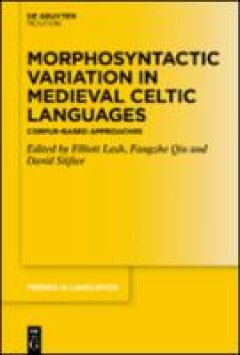
Morphosyntactic variation in medieval Celtic languages : corpus-based approaches
This book showcases the state of the art in corpus-based linguistic analysis of Celtic languages (specifically, Old/Middle Irish, Middle Welsh, and Cornish). It explores corpus approaches to morphosyntactic variation in the medieval Celtic languages and, for the first time, situates them in the broader field of computational and corpus linguistics by providing descriptions of tools for processi…
- Edition
- -
- ISBN/ISSN
- 9783110680744
- Collation
- xviii, 396 p. : ill.
- Series Title
- -
- Call Number
- 491.627 LAS m
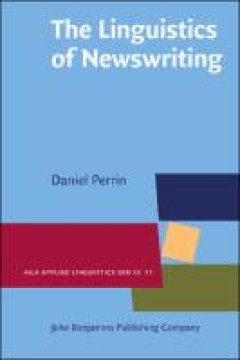
The linguistics of newswriting
The Linguistics of Newswriting focuses on text production in journalistic media as both a socially relevant field of language use and as a strategic field of applied linguistics. The book discusses and paves the way for scientific projects in the emerging field of linguistics of newswriting. From empirical micro and theoretical macro perspectives, strategies and practices of research developm…
- Edition
- -
- ISBN/ISSN
- 9789027271389
- Collation
- xiiii, 317 p. : ill.
- Series Title
- -
- Call Number
- 302.2 PER t
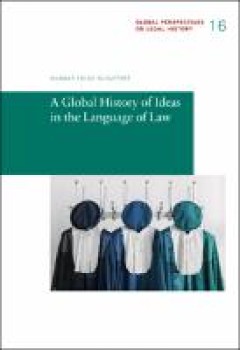
A global history of ideas in the language of law
This book argues that the narrowing focus of the global history of ideas on narratives in historical research, philosophy and political theory neglects the fact that the central concepts of the history of political ideas are articulated in the language of law. Key figures of the history of ideas, like Kant, Hegel and Weber, engaged deeply with the philosophy and sociology of law. This monograph…
- Edition
- -
- ISBN/ISSN
- 9783944773315
- Collation
- xi, 309 p. : ill.
- Series Title
- Global Perspectives on Legal History volume 16
- Call Number
- 340.14 SCH a
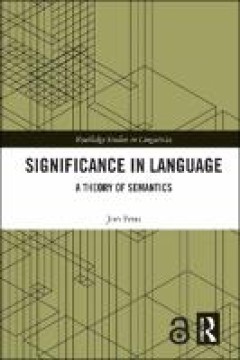
Significance in language: a theory of semantics
This book offers a unique perspective on meaning in language, broadening the scope of existing understanding of meaning by introducing a comprehensive and cohesive account of meaning that draws on a wide range of linguistic approaches. The volume seeks to build up a complete picture of what meaning is, different types of meaning, and different ways of structuring the same meaning across myriad …
- Edition
- -
- ISBN/ISSN
- 9781003259381
- Collation
- vi, 330 p. : ill.
- Series Title
- Routledge Studies in Linguistics
- Call Number
- 420.143 FEI s
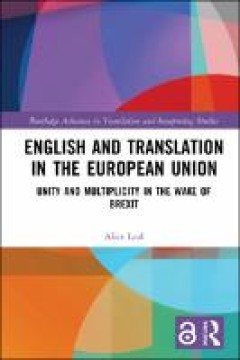
English and translation in the European Union : unity and multiplicity in the…
This book explores the growing tension between multilingualism and monolingualism in the European Union in the wake of Brexit, underpinned by the interplay between the rise of English as a lingua franca and the effacement of translations in EU institutions, bodies and agencies. English and Translation in the European Union draws on an interdisciplinary approach, highlighting insights from appli…
- Edition
- -
- ISBN/ISSN
- 9780429282812
- Collation
- x, 218 p. : ill.
- Series Title
- Routledge Advances in Translation and Interpreting Studies
- Call Number
- 306.446094 LEA e
Latin as the language of science and learning
This book investigates the role of the Latin language as a vehicle for science and learning from several angles. First, the question what was understood as ‘science’ through time and how it is named in different languages, especially the Classical ones, is approached. Criteria for what did pass as scientific are found that point to ‘science’ as a kind of Greek Denkstil based on pattern-…
- Edition
- -
- ISBN/ISSN
- 9783110745832
- Collation
- XIII, 646 p.
- Series Title
- Lingua Academica
- Call Number
- 470.9 ROU l
Multimodal Texts in Disciplinary Education : A Comprehensive Framework
This open access book provides an introduction to multimodality and the role of multimodal texts in today’s education. Presenting a comprehensive framework for analysing and working with multimodal texts in disciplinary education, it serves as a tool for researchers and teachers alike. The second part of the book focuses on sample analyses of a variety of educational texts for different age g…
- Edition
- -
- ISBN/ISSN
- 9783030639600
- Collation
- xiv, 132 p. : ill.
- Series Title
- -
- Call Number
- 371.3 DAN m

EMI and beyond : internationalising higher education curricula in Italy
This collection presents the state of the art on English-medium instruction (EMI) / Integrating content and language (ICL) in Italian higher education, drawing attention to different critical aspects of the teaching/learning experience and highlighting the perspectives of various educational stakeholders regarding the effectiveness of tertiary study in a foreign language. The chapters draw on a…
- Edition
- -
- ISBN/ISSN
- 9788860461827
- Collation
- vi, 285 p. : color, ill
- Series Title
- -
- Call Number
- 420.71145 MAS e
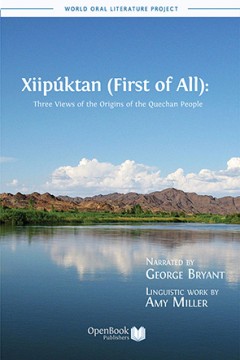
Xiipúktan (first of all): three views of the origins of the Quechan people
The Quechan people live along the lower part of the Colorado River in the United States. According to tradition, the Quechan and other Yuman people were created at the beginning of time, and their Creation myth explains how they came into existence, the origin of their environment, and the significance of their oldest traditions. The Creation myth forms the backdrop against which much of the tr…
- Edition
- -
- ISBN/ISSN
- 9781909254411
- Collation
- 210 p. ; 24 cm
- Series Title
- -
- Call Number
- 973.0497 BRY x
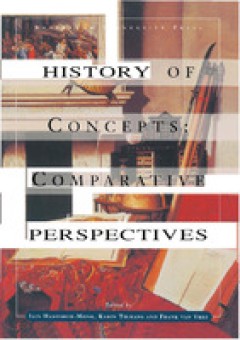
History of concepts : comparative perspectives
Although vastly influential in German-speaking Europe, conceptual history (Begriffsgeschichte) has until now received little attention in English. This genre of intellectual history differs from both the French history of mentalités and the Anglophone history of discourses by positing the concept - the key occupier of significant syntactical space - as the object of historical investigation. C…
- Edition
- -
- ISBN/ISSN
- 9053563067
- Collation
- ix, 293 p. : ill
- Series Title
- -
- Call Number
- 907.2 VAN h
 Computer Science, Information & General Works
Computer Science, Information & General Works  Philosophy & Psychology
Philosophy & Psychology  Religion
Religion  Social Sciences
Social Sciences  Language
Language  Pure Science
Pure Science  Applied Sciences
Applied Sciences  Art & Recreation
Art & Recreation  Literature
Literature  History & Geography
History & Geography